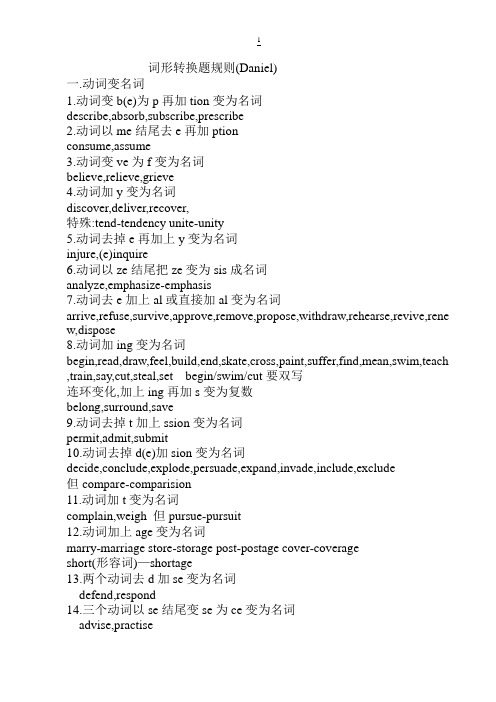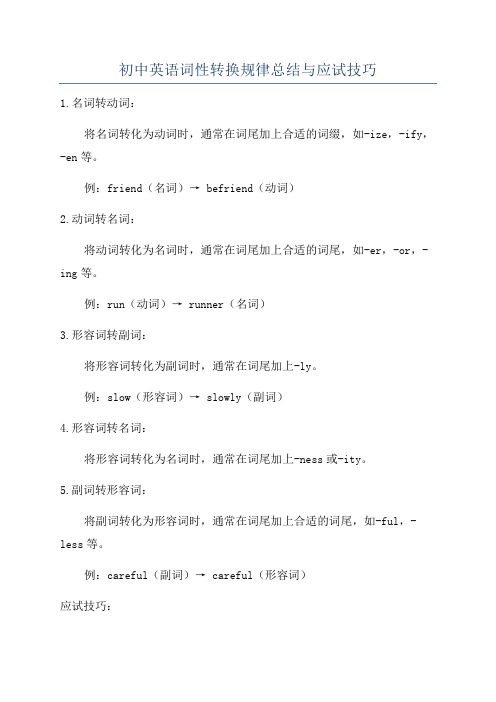英语词性转换动词变为名词的一般规则
高考英语语法填空词性转换题规则

词形转换题规则(Daniel)一.动词变名词1.动词变b(e)为p再加tion变为名词describe,absorb,subscribe,prescribe2.动词以me结尾去e再加ptionconsume,assume3.动词变ve为f变为名词believe,relieve,grieve4.动词加y变为名词discover,deliver,recover,特殊:tend-tendency unite-unity5.动词去掉e再加上y变为名词injure,(e)inquire6.动词以ze结尾把ze变为sis成名词analyze,emphasize-emphasis7.动词去e加上al或直接加al变为名词arrive,refuse,survive,approve,remove,propose,withdraw,rehearse,revive,rene w,dispose8.动词加ing变为名词begin,read,draw,feel,build,end,skate,cross,paint,suffer,find,mean,swim,teach ,train,say,cut,steal,set begin/swim/cut要双写连环变化,加上ing再加s变为复数belong,surround,save9.动词去掉t加上ssion变为名词permit,admit,submit10.动词去掉d(e)加sion变为名词decide,conclude,explode,persuade,expand,invade,include,exclude但compare-comparision11.动词加t变为名词complain,weigh 但pursue-pursuit12.动词加上age变为名词marry-marriage store-storage post-postage cover-coverageshort(形容词)—shortage13.两个动词去d加se变为名词defend,respond14.三个动词以se结尾变se为ce变为名词advise,practise15.两个动词变为名词后以ice结尾变为名词choose-choice serve-service16.动词加ence变为名词prefer,differ,exist,refer,occur,resist17.动词加ance变为名词appear,perform,assist,attend,accept,allow,acquaint 特殊:enter-entrance 18.动词去e再加ance变为名词guide,insure,tolerate19.动词以s或t结尾一般直接加ion变为名词30A:add,attract,adopt 3C:collect,connect,contradict,construct 4D:discuss,depress 2E:elect,express,exhibit,exhaust 4I:instruct,inspect,impress,invent,interact,inject,interrupt 7O:object,obsess 2P:possess,prevent,perfect,predict 4R:react,reflect 2S:suggest,select 2特殊:receive-reception recognize-recognition solve-solutionresolve-resolution destroy-destruction suspect-suspicion abolish-abolition 20.动词以te或se结尾一般去掉e再加上ion变为名词41A:appreciate,associate 2C:confuse,congratulate,celebrate,concentrate,communicate,circulate,consoli date 7D:decorate,devote,donate,distribute,discriminate,dictate 6E:educate,eliminate,evaluate,estimate 4F:fascinate,frustrate 2G:graduate 1H:hesitate,hibernate 2I:indicate,illustrate,innovate,immigrate 4L:locate,liberate 2M:motivate,migrate 2N.negotiate 1O:operate,obligate,oppose 3P:participate,pollute,promote 3R:revise 1S:situate 121.动词去掉e再加ation变为名词17A:admire,adore 2C:combine,converse,conserve 3D:determine 1E:explore,examine 2I:invite,imagine,inspire 3O:organize,observe 2P:prepare 1R:realize,reserve 2S:starve 1但administer-administration22.动词直接加ation变为名词expect,consider,present,transport,adapt,transform,limit,recommend,relax,te mpt23.两个动词需去掉倒数第二个i再加ation变为名词explain-explanation exclaim-exclamation24.以y结尾的动词去y加上action变为名词或变y为i再加action变为名词satisfy-satisfaction,qualify-qualificationapply-application,identify-identification25.动词以ce结尾去e再加tion变为名词introduce,reduce,induce,produce26.动词去掉e再加ition变为名词compete,oppose,compose特殊: repeat-repetition recognize-recognition27.动词去掉e变为名词breathe,bathe28.动词加上ment变为名词37A:achieve,advertise,amaze,astonish,arrange,agree,appoint,amuse,accomplish ,assess,argue 11C:commit 1D:develop,disappoint,discourage 3E:excite,equip,enjoy,entertain,embarrass,employ,encourage,establish,enforce 9F:fulfill 1G:govern 1I:involve,improve 2J:judge 1M:manage 1P:punish,pay 2R:require,retire,reinforce 3S:settle,state 2特殊:argue-argument 必须去掉e再加men judge-jud(e)ment有e无e都可以29.动词变ize为y变为名词apologize,memorize30.动词加上ure变为名词fail,mix,press,depart动词去掉e加上ure变为名词please,expose特殊:sign-signature31.动词加上ant变为名词assist,attend特别:apply-applicant participate-participant32.无规律变化prove-proof behave-behavior think-thought die-death fly-flighthate-hatred rob-robbery bleed-blood二.动词变形容词1.动词加上ite变为形容词favour,oppose-opposite2.动词的过去分词就是形容词alarm,acquire,adopt,hurt,wound,injure,lose,go,break,leave,relieve,bend,infor m ,marry,divorce,impress,devote,fix,note,endanger,locate,seat,addict,commit ,dedicate,involve,engage,prepare,age,balance,crowd,occupy,delight,overjoy, determine,disable,drink,distinguish,mistake,motivate,qualify,stress,learn,org anize,honor,privilege,fix,note,endanger3.动词的过去分词与现在分词就是形容词interest,move,surprise,worry,frighten,scare,terrify,amuse,excite,thrill,annoy,e mbarrass,please,shock,satisfy,convince,disappoint,discourage,depress,frustra te,amaze,astonish,annoy,inspire,exhaust4.动词加上ing变为形容词或去掉e再加上ing变为形容词miss,demand,reward,promise,challenge,invite,strike,remain,love,encourage,f ollow,lead,press,fill,fulfill5.动词加上able变为形容词comfort,favor,agree,accept,enjoy,suit,avoid,profit,replace,adapt,work6.动词去掉e再加上able变为形容词admire,desire,achieve,advise,adore 特殊:rely-reliable7.动词加上ial变为形容词benefit-benificial influence-influential8.动词加上ive变为形容词impress,attract,instruct,interact,protect,reflect,act,react,select,collect,support,express,exhaust9.动词去掉e再加ive变为形容词create,cooperate,communicate,innovate,appreciate,特殊:produce-productive compete-competitive attend-attentive10.动词加上ative变为represent,talk,imagine-imaginative11.动词变de为sive变为形容词decide,conclude,explode,include,exclude12.动词去e加上ant变为形容词ignore,tolerate特别:hesitate-hesitant13.动词加上ent变为形容词depend14.动词加上ful变为形容词care,cheer,thank,stress,regret15.动词加上ate变为形容词consider,fortune(名词)-fortunate16.动词加上ly变为形容词live,love17.动词加上ious变为形容词infect 但suspect--suspicious envy-envious continue-continuous18.动词加上less变为形容词care,end,help,count,use19.特殊slip-slippery volunteer-voluntary三.名词变形容词1.名词加上ful变为形容词success,shame,care,cheer,thank,stress,regret,peace,skill,meaning,help,use,pa in,beauty,thought,colour,sorrow,hope,doubt,tear,grace2.以ce结尾的名词把ce变为t变为形容词importance,confidence,difference,silence,convenience,patience,absence,pres ence,independence,significance,diligence,intelligence,excellence,violence,co mpetence,distance,evidence,innocence,arrogance,consequence,coincidence,c onsistence3.名词加上ive变为形容词effect,subject,object,mass,excess 但expense-expensive4.名词加上al变为形容词tradition,education,environment,convention,accident,occasion,person,origin, nation,music,emotion,addition,season,coast特殊:center-central society-social medicine-medical technique-technical 5.名词去e加上al变为形容词practice,globe,culture,universe,nature,6.以cs结尾的名词把s变为al变为形容词politics-political physics-physical geography-geographical mathematics-mathematical7.名词变y为i加(c)al变为形容词history-historical chemistry-chemical technology-technologicalindustry-industrial8.名词去e加ial变为形容词face,influence,finance,commerce特殊:part-partial benefit-beneficial confidence-confidential society-social essence-essential9.ic结尾的形容词energy-energetic science-scientific base-basic reality-realistic artist-artistic enthusiasm-enthusiastic fantasy-fantastic volcano-volcanicreality-realistic system-systematic sympathy-sympathetic10.名词加上ible变为形容词access,terror-terrible,sense-sensible,horror-horrible11.名词加上able变为形容词avail,reason,comfort,fashion,value-valuable,knowledge-knowledgeable 12.名词加上en变为形容词wood,wool13.名词加上ly变为形容词friend,week,love,time,mother,father,man,child特殊:day-daily14.名词加上less变为形容词self,speech,aim,count,care,help,hope,home,use,price,worth,value penny—penniless15.名词加上ed变为形容词detail,talent,gift,skill,experience,crowd16.变y为i再加ous变为形容词vary(动词),harmony,mystery17.名词加上ous变为形容词humor,courage,danger,mountain,poison,fame-famous,adventure-adventurous18.三个名词以tion结尾把n变为us变为名词caution,ambition,religion19.以ty结尾的名词变形容词curiosity,generosity,anxiety,20.名词加上ish变为形容词fool,self,child21.名词加上y变为形容词health,wealth,risk,luck,need,mess,sleep,thirst,dirt,salt,cloud,wind,rain,snow, greed,mist,guilt,smell,rock,blood,stick,water,hand,hill fog-foggy sun-sunny mud-muddy22.名词去e再加y变为形容词taste,juice,noise,scare,spice,ice23.两个名词去掉倒数第二个字母e再加y变为形容词anger,hunger四.形容词变名词1.两个以ous结尾的形容词去掉u在s后加ity变为名词curious,generous2.两个以ous结尾的形容词把ous变为ety变为名词various,anxious特殊:social-society3.三个去e加上ity变为名词diverse,creative,secure4.六个形容词加ity变为名词major,minor,equal,real,similar,popular特殊:necessary-necessity5.三个形容词以t结尾加上y变为名词honest,modest,difficult6.形容词加上ty变为名词safe,certain,cruel7.以ble结尾的形容词把ble变为bility即3变6变为名词able,possible,responsible,available,flexible,capable8.形容词加上ness变为名词kind,careful,weak,dark,careless,eager,willing,sick,ill,fit9.形容词需要变y为i再加ness变为名词happy,friendly,lonely,lazy10.形容词或动词加上th变为名词warm,grow特殊:deep-depth11.两个形容词以ong结尾变ong为ength变为名词long,strong特殊:young-youth12.两个形容词需去e再加th变为名词true,wide13.两个以eight结尾的名词weigh-weight,high-height14.形容词去t加cy变为名词efficient,fluent,frequent,urgent,emergent,vacant15.形容词去te加cy变为名词accurate,private16.去e加y结尾的名词injure,brave-bravery17.形容词加上(d)om变为名词free,wise-wisdom,bored18.两个形容词以tinct结尾加上ion变为名词distinct,extinct五.名词变动词1.名词加上后缀en变为动词fright,light,bright,red,strength,threat,length2.名词加上前缀en变为动词danger,courage,joy,force,counter,title,code3.名词加上前缀em变为动词body,power,brace六.形容词变动词1.形容词加上后缀en变为动词loose,tight,wide,deep,weak,worse,less,soft,broad,short2.形容词加上前缀en变为动词able,large,rich,sure,close七.形容词变副词的特殊情况1.以le结尾的形容词去e加y变为副词高中常考:simple,terrible,possible,gentle,probable,comfortable,flexible ,responsible,incredible,inevitable,unbelievable,unavoidable其它可能会考:idle,able,,reliable,considerable,(in)visible,stable,remarkable, favorable,sustainable,portable, horrible,admirable,noticeable, miserable,memorable,fashionable (这些权当过过词汇瘾)特殊whole--wholly sole-solely2.两个形容词以ue结尾需要去掉不发音的字母e再加ly变为副词true,due3.两个以ll结尾的形容词加上y变为副词full-fully,dull-dully4.以ic结尾的形容词加上ally变为副词basic,scientific,automatic,optimistic,magic,pessimistic,enthusiastic,energetic ,sympathetic,systematic,terrific,dramatic,fantastic,historic,authentic,allergic, domestic,democratic, economic,gigantic,realistic,romantic特殊:public-publicly5.双重变化shy-shyly/shily dry-dryly/drily6.名词变副词名词+ward(s) backwards,northwards名词+ways sideways名词+wise clockwise,crosswise。
英语动词变名词的变化规则

英语动词变名词的变化规则在英语语法中,动词(Verb)和名词(Noun)是语言中最基本的词类之一。
动词用来表示动作、状态或事件,而名词则用来表示人、事物、地点或概念等。
然而,有时我们需要将动词转化为名词形式。
英语中动词变名词的变化规则可以通过以下几种方式实现:1. 加后缀 -ing将动词转化为名词的一种常见方式是在动词后面加上后缀“-ing”。
这种形式的名词通常表示正在进行的动作或某个动作的结果。
例如: - learn (学习) → learning (学习) - swim (游泳) → swimming (游泳) - read (阅读) → reading (阅读)需要注意的是,部分动词在后缀“-ing”后需要做一些拼写上的变化,例如: - run (跑步) → running (跑步) - write (写) → writing (写作)2. 加后缀 -tion, -sion, -ation or -ition另一种常用的将动词转化为名词的方式是在动词的基础形式后面加上后缀“-tion”, “-sion”, “-ation” 或“-ition” 之一。
这些后缀表示动作、状态或概念。
例如: - create (创造) → creation (创造) - admit (承认) → admission (承认) - transmit (传输) → transmission (传输)需要特别注意的是,部分动词在加上这些后缀时需要做一些拼写上的变化,例如: - operate (操作) → operation (操作) - perform (执行) → performance (表演)3. 加前缀 re-有些动词在变成名词时需要加上前缀“re-”。
这种前缀表示重复或重新进行某个动作。
例如: - build (建造) → rebuild (重建) - print (打印) → reprint (重印) - connect (连接) → reconnect (重新连接)需要注意的是,并非所有动词都适用于加上“re-”前缀变成名词的情况。
高考英语二轮复习语法突破:词性转换

精品基础教育教学资料,仅供参考,需要可下载使用!考点一、动词、形容词转化为名词的规律1.动词变名词的后缀-ing begin→beginning开始-ure/-ture fail→failure失败;倒闭press→pressure 压力depart→departure 离开;出发mix→mixture 混合;混合物特殊:expose→exposure 暴露-y recover→recovery恢复;痊愈discover→discovery 发现其他choose→choice选择vary→variety 多样化;种类tend→tendency 趋向;趋势2.形容词变名词的后缀后缀例词-age short→shortage不足;短缺-cy accurate→accuracy准确性private→privacy 隐私;私密efficient→efficiency 效率;功效fluent→fluency 流利;流畅-dom free→freedom自由;自主特殊:wis e→wisdom 明智;智慧bored→boredom 厌烦-ence/-ance different→difference差异silent→silence 沉默patient→patience 耐心absent→absence 缺席present→presence 出席confident→confidence 信心convenient→convenience 便利important→importance 重要-ness weak→weakness虚弱;弱点kind→kindness 仁慈;好意careless→carelessness 粗心大意考点二、名词或动词转化为形容词的规律-ing surprise→surprising令人惊异的convince→convincing 令人信服的satisfy→satisfying 令人满意的ible access→accessible容易取得的horror→horrible 可怕的;恐怖的terror→terrible 可怕的-ive act→active积极的;活跃的effect→effective 有效的;生效的attract→attractive 有吸引力的impress→impressive 给人深刻印象的-ous continue→continuous不断的;持续的anxiety→anxious 忧虑的caution→cautious 十分小心的;谨慎的curiosity→curious 好奇的humor→humorous 幽默的-some tire→tiresome令人厌倦的trouble→troublesome 麻烦的-y taste→tasty美味的;可口的health→healthy 健康的wealth→wealthy 富裕的;丰富的-ern east→eastern东方的;向东的-ish child→childish孩子气的fool→foolish 愚蠢的;可笑的self→selfish 自私的注意:-ed形容词多表示主语所处的状态,意为“感到……的”,通常修饰人;-ing形容词多表示主语所具有的特征,意为“令人……的”,通常修饰物或事。
英语词性转换七大规则

英语词性转换七⼤规则
英语词性转换包括:动词转化为名词;动词转化成名词-形容词;动词转化成形容词,副词,名词;名词转化为形容词;名词转化为名词复数;形容词转化为副词;形容词转化为副词,名词。
英语词性转换七⼤规则及例⼦
(1)动词转化为名词, post-postage mail-mail weigh-weight advise-advice
(2)动词转化成名词-形容词 act-actor / actress-active change-change-changeable
(3)动词转化成形容词,副词,名词 fill-full,need-necessary-necessarily interest(v. / n.) interested /interesting
(4)名词转化为形容词 person personal ( 个⼈的; 私⼈的 ) fun funny
(5)名词转化为名词复数 gentleman gentlemen human humans
(6)形容词转化为副词 possible possibly probable probably
(7)形容词转化为副词,名词 true truly truth lucky luckily luck。
英语单词词性转换的基本规律课件

英语单词词性转换的基本规律.动词(v.)→名词(n.)(a)词形不变,词性改变例如:work, study, water, plant等可以用作动词(工作,学习,浇水,种植),也可以用作名词(工作,学习,水,植物).(b)一些动词在词尾加上-er或-or之后就变成了表示"某一类人"的名词例如:work—worker, teach—teacher, sing—singer,jump—jumper, play—player, learn—learner,visit—visitor, invent—inventor,collect—collector等.注意:1)以不发音的e结尾的动词,在词尾加-r.例如:drive—driver, write—writer等.2)以重读闭音节结尾,且末尾只有一个辅音字母的动词,应双写末尾的辅音字母,再加-er例如:run—runner, win—winner,begin—beginner等.(c)在动词词尾加上-ment 变成名词例如:achieve—achievement (成就)advertise—advertisement//advertising(广告)agree—agreement disgree—disagreementamuse—amusement (娱乐) improve—improvement(争吵)commit(奉献)—commitment develop—development (发展)depart—department (局,部) govern(统治)—government(政府) manage—management (管理) equip—equipment (装备)有些单词比较特殊,需把动词后的e去掉再加ment.例如:argue—argument(争论)(d)在动词词尾加上-(t)ion/(s)ion变成名词例如: attract—attraction; instruct—instruction;invent—invention discuss—discussion;express—expression educate—education;graduate—graduation; operate—operation (去e再加"ion")compete—competition; organize—organization (把e改成其他字母再加"tion") decide—decision conclude—conclusion (把de改为s再加"ion")describe—description描写,描绘 (这是特例,不规则变化)(e)在动词词尾加上-ance变成名词例如: appear—appearance (外貌;出现)perform—performance (演出)accept—acceptance (接受)(f)在动词词尾加-ing变成名词 (方法与动词变为现在分词的方法相同)例如:meet—meeting build—building wait—waitingbathe—bathing say—saying(谚语) mean—meaningend —ending train —training wash—washing注意:以重读闭音节结尾,且末尾只有一个辅音字母的动词,应双写末尾的辅音字母,再加-ing如:swim—swimming shop—shopping begin—beginning(g)其他一些比较特殊的变化例如: Beg(乞讨)—beggar(乞丐) behave(行为举止)—behaviorknow(知道)—knowledge(知识) fly—flight (飞行)heat (加热)—heat(热量) hit (撞击)—hit( 轰动一时的人或物,碰撞)mix (混合)—mixture(混合物) press(按,压)—pressure(压力)sit(坐)—seat (座位) succeed—success(成功)tour—tour(旅游)/ tourist (游客)2.动词(v.)→形容词(adj.)(a)动词后面加able,以e结尾的动词则去e加able,表示具有此性质,特点或属性.例如: afford-affordable;love-lovable(b)动词后面加ed,以e结尾的动词则直接加d,表示被动性的属性或特点.例如: scatter-scattered use-used(c)不规则的动词则必须记忆,记住其过去分词形式.规律不大,意义同(b).3.名词(n.)→形容词(adj.)(a)在名词后面加-y可以变成形容词(尤其是一些与天气有关的名词)例如: rain—rainy, cloud—cloudy, wind—windy, snow—snowy,health—healthy, luck—lucky,anger—angry guilt—guilty(内疚的)tourist—touristy(游客多的) , salt (盐)—salty (咸的)silk(丝绸)—silky(丝绸般的), sleep—sleepy (昏昏欲睡的)注意:1)如果以重读闭音节结尾,且词尾只有一个辅音字母,这时应双写辅音字母再加"-y".如: sun—sunny, fun—funny, fog—foggy(有雾的), fur—furry(毛皮的)2)少数以不发音的e结尾的名词变为形容词时,应去掉e再加"-y".如: noise—noisy, ice—icy, shine—shiny(发亮的), taste(口味)—tasty(甜的)(b)名词后面加-ed,以e结尾的直接加d.例如: spot(斑点)—spotted(有斑点的); talent—talented (有天赋的)organize—organized 有组织的; balance—balanced(平衡的)(c)一些抽象名词在词尾加-ful可以变为形容词例如:care—careful, thank—thankful, help—helpful,use—useful, meaning—meaningful(d)在名词后加-less构成含有否定意义的形容词例如:care—careless(粗心的), use—useless(无用的)hope—hopeless(没希望的),home—homeless(无家可归的)(e)一些以-ce结尾的名词,把-ce改为-t变成形容词例如: difference—different, silence—silent, confidence—confident(f).在名词后加-ly变为形容词例如: friend—friendly, love—lovely, live---lively(g).在名词后加-ous变为形容词例如: danger—dangerous(h)名词后面加-al变为形容词例如: music—musical; medicine—medical (这个比较特殊)(i)名词后面加-able变为形容词,如果以e结尾就去e再加"-able". 例如: adjust—adjustable 可调整的 value—valuable有价值的(j)名词后面加-en变成形容词例如: wood—wooden 木制的 wool—woolen 羊毛的(k)一些表示国家的名词可以在词尾加-ese, -ish或-n构成表示国籍,语言的形容词例如:China—Chinese, Japan—Japanese, England—English,America—American, India—Indian, Australia —Australian(注意Canada—Canadian)4..形容词(adj.)→副词(adv.)▲一般在形容词的词尾加-ly可以变成副词例如: quick—quickly, slow—slowly, loud—loudly, sudden—suddenly 等但是,以下几点值得注意:(a) 一些以"辅音字母+y"结尾的形容词,要把y改为i再加-ly例如: happy—happily, angry—angrily, lucky—luckily, heavy—heavily, noisy—noisily(b) 有些以-ble或-le结尾的形容词,去掉e加-y例如:possible—possibly, terrible—terribly(c)少数以e结尾的形容词,要去掉e再加-ly例如: true—truly但绝大多数以e结尾的形容词仍然直接加-ly 例如: polite—politely, wide—widely(d)以-l结尾的形容词变为副词时要在词尾加-ly,以-ll结尾的才在词尾只加-y.例如: usual—usually, careful—carefully, useful—usefullyfull—fully (以-ll结尾的才只加y)元音辅音以及重读闭音节:1.英语26个字母中,a e i o u是元音字母, y是半元音字母, 其余都是辅音字母.★所谓半元音就是有时候做元音,有时候做辅音.半元音字母y做元音有: shy,sky做辅音比如最简单的:yes2.开音节和闭音节开音节分两种:绝对开音节和相对开音节绝对开音节指的是"元音字母结尾"的音节 (例如 we, hi等)相对开音节是指"辅音字母-元音字母-辅音字母-不发音的e"的音节,(r除外). ( 例如,take,make等)比如:take (在这个单词中,t是辅音,a是元音,k是辅音,e是不发音的元音)◆在开音节中, 元音字母发他们在字母表中的音闭音节, 则是指"辅音字母-元音字母-辅音字母"的音节( -al等除外) (例如:leg,cross等)◆在闭音节中,元音字母发不同的音a e i o u例 sat let sit not nut (试着读下这些单词,这些单词中,元音发的音都不是它们在字母表中发的音)2.英语重读闭音节就是以辅音因素结尾的,而且是重读音节的音节.比如apple 划音节就因该是ap/ple 前面那个ap是一个音节,这个音节以辅音因素p结尾,所以就是闭音节.(仅仅能看出是闭音节,是不是重读闭音节还要看这个音节是不是重读的)重读闭音节三要素:1. 必须是重读音节;2. 最后只有一个辅音字母;3.元音字母发短元音 ( 说通俗点,打个比方, /u/是短元音,/u:/是长元音)重读闭音节即两个辅音中间夹一个元音.如:sit---sitting begin---beginning(重读在gin这个音节上)●像travel这个单词,"vel"也是"辅音+元音+辅音"的结构,但是重音不在vel这个音节上,所以不用双写"l",可以为travelled,也可以是traveled,更常用的是后者.。
初中英语词性转换规律总结与应试技巧

初中英语词性转换规律总结与应试技巧
1.名词转动词:
将名词转化为动词时,通常在词尾加上合适的词缀,如-ize,-ify,-en等。
例:friend(名词)→ befriend(动词)
2.动词转名词:
将动词转化为名词时,通常在词尾加上合适的词尾,如-er,-or,-ing等。
例:run(动词)→ runner(名词)
3.形容词转副词:
将形容词转化为副词时,通常在词尾加上-ly。
例:slow(形容词)→ slowly(副词)
4.形容词转名词:
将形容词转化为名词时,通常在词尾加上-ness或-ity。
5.副词转形容词:
将副词转化为形容词时,通常在词尾加上合适的词尾,如-ful,-less等。
例:careful(副词)→ careful(形容词)
应试技巧:
1.注意词根词缀的变化,有时候词性转换还会伴随着词根的变化。
2.大多数常见的词性转换规律都已掌握,但仍需多练习和记忆,积累的是经验。
3.定期回顾已学习过的词性转换规律,形成记忆,提高应对考试的能力。
4.在考试前,可以查阅常见的词性转换规律,熟悉一些常考的单词词性转换,增加应对考试的信心。
英语单词词性转换
英语单词词性转换一、动词(v.)→名词(n.)1、词尾加上-er或-or之后就变成了表示"某一类人"的名词例如:work—worker, teach—teacher, sing—singer,jump—jumper, play—player, learn—learner,visit—visitor, invent—inventor,collect—collector等.注意:1)以不发音的e结尾的动词,在词尾加-r.例如:drive—driver, write—writer等.2)以辅音字母开头并以元音字母加辅音字母结尾的单词,应双写末尾的辅音字母再加er。
例如:run—runner, win—winner,begin—beginner等.2.在动词词尾加上-ment 变成名词例如:achieve—achievement (成就)advertise—advertisement例如:argue—argument(争论)3.在动词词尾加上-(t)ion/(s)ion变成名词例如: attract—attraction; instruct—instruction;invent—invention discuss—discussion;express—expression educate—education;graduate—graduation; operate—operation (去e再加"ion")compete—competition; organize—organization (把e改成其他字母再加"tion")decide—decision conclude—conclusion (把de改为s再加"ion")describe—description描写,描绘 (这是特例,不规则变化)4.在动词词尾加上-ance变成名词例如: appear—appearance (外貌;出现)perform—performance (演出)accept—acceptance (接受)resist-resistance n.抵抗,阻力5.在动词词尾加-ing变成名词 (方法与动词变为现在分词的方法相同)例如:meet—meeting build—building wait—waitingbathe—bathing say—saying(谚语) mean—meaning注意:以辅音字母开头并以元音字母加辅音字母结尾的单词,应双写末尾的辅音字母再加-ing如:swim—swimming shop—shopping begin—beginning二、动词(v.)→形容词(adj.)1.动词后面加able,以e结尾的动词则去e加able,表示具有此性质,特点或属性.例如: afford-affordable;love-lovable2.动词后面加ed,以e结尾的动词则直接加d,表示被动性的属性或特点.例如: scatter-scattered use-used3不规则的动词则必须记忆,记住其过去分词形式.规律不大,意义同(b).三.名词(n.)→形容词(adj.)1.在名词后面加-y可以变成形容词(尤其是一些与天气有关的名词)例如: rain—rainy, cloud—cloudy, wind—windy, snow—snowy,health—healthy, luck—lucky,anger—angry guilt—guilty(内疚的)tourist—touristy(游客多的) , salt (盐)—salty (咸的)silk(丝绸)—silky(丝绸般的), sleep—sleepy (昏昏欲睡的)注意:1)如果以辅音字母开头并以元音字母加辅音字母结尾,这时应双写辅音字母再加"-y".如: sun—sunny, fun—funny, fog—foggy(有雾的), fur—furry(毛皮的)2)少数以不发音的e结尾的名词变为形容词时,应去掉e再加"-y".如: noise—noisy, ice—icy, shine—shiny(发亮的), taste(口味)—tasty(甜的) 2.名词后面加-ed,以e结尾的直接加d.例如: spot(斑点)—spotted(有斑点的); talent—talented (有天赋的)organize—organized 有组织的; balance—balanced(平衡的)3.一些抽象名词在词尾加-ful可以变为形容词例如:care—careful, thank—thankful, help—helpful,use—useful, meaning—meaningful4.在名词后加-less构成含有否定意义的形容词例如:care—careless(粗心的), use—useless(无用的)hope—hopeless(没希望的),home—homeless(无家可归的)5.一些以-ce结尾的名词,把-ce改为-t变成形容词例如: difference—different, silence—silent, confidence—confident6.在名词后加-ly变为形容词例如: friend—friendly, love—lovely, live---lively7.在名词后加-ous变为形容词例如: danger—dangerous prosperous a 繁荣的(pro 在前+sper 希望+ous)8.名词后面加-al变为形容词例如: music—musical; medicine—medical (这个比较特殊)9名词后面加-able变为形容词,如果以e结尾就去e再加"-able".例如: adjust—adjustable 可调整的 value—valuable有价值的10.名词后面加-en变成形容词例如: wood—wooden 木制的 wool—woolen 羊毛的四.形容词(adj.)→副词(adv.)▲一般在形容词的词尾加-ly可以变成副词例如: quick—quickly, slow—slowly, loud—loudly, sudden—suddenly 等例如:possible—possibly, terrible—terribly。
英语单词词性转换的基本规律
英语单词词性转换的基本规律.动词(v.)→名词(n.)(a)词形不变,词性改变例如:work, study, water, plant等可以用作动词(工作,学习,浇水,种植),也可以用作名词(工作,学习,水,植物).(b)一些动词在词尾加上-er或-or之后就变成了表示"某一类人"的名词例如:work—worker, teach—teacher, sing—singer,jump—jumper, play—player, learn—learner,visit—visitor, invent—inventor, collect—collector等.&注意:1)以不发音的e结尾的动词,在词尾加-r.例如:drive—driver, write—writer等.2)以重读闭音节结尾,且末尾只有一个辅音字母的动词,应双写末尾的辅音字母,再加-er例如:run—runner, win—winner, begin—beginner(新手,初学者)等.(c)在动词词尾加上-ment 变成名词例如:achieve—achievement (成就)advertise—advertisement例如:argue—argument(争论)*(d)在动词词尾加上-(t)ion/(s)ion变成名词例如: (吸引)attract—attraction; (指导)instruct—instruction;invent—invention discuss(讨论)—discussion;express(表达)—expression educate—education;graduate—graduation; operate(操作,动手术)—operation (去e再加"ion")compete(竞赛,比赛)—competition;organize—organization (把e改成其他字母再加"tion")decide—decision conclude(结束,推断,决定)—conclusion (结论,结局) (把de改为s再加"ion")describe—description描写,描绘(这是特例,不规则变化)!(e)在动词词尾加上-ance变成名词例如: appear—appearance (外貌;出现)Perform(表演)—performance (演出)accept—acceptance (接受)(f)在动词词尾加-ing变成名词(方法与动词变为现在分词的方法相同)例如:meet(遇见)—meeting(会议) build—building wait—waitingbathe—bathing say—saying(谚语) mean—meaning(意义,含义)end(结束) —ending(结尾,结局) train(火车,训练) —training(训练) wash(洗涤)—washing…注意:以重读闭音节结尾,且末尾只有一个辅音字母的动词,应双写末尾的辅音字母,再加-ing如:swim—swimming shop—shopping begin—beginning(g)其他一些比较特殊的变化例如: Beg(乞讨)—beggar(乞丐) behave(行为举止)—behavior know(知道)—knowledge(知识) fly—flight (飞行)heat (加热)—heat(热量) hit (撞击)—hit( 轰动一时的人或物,碰撞)mix (混合)—mixture(混合物) press(按,压)—pressure(压力)(sit(坐)—seat (座位) succeed—success(成功)tour—tour(旅游)/ tourist (游客)2.动词(v.)→形容词(adj.)(a)动词后面加able,以e结尾的动词则去e加able,表示具有此性质,特点或属性.例如: afford-affordable(负担得起);love-lovable(可爱的)(b)动词后面加ed,以e结尾的动词则直接加d,表示被动性的属性或特点.例如: scatter(分散,散开)-scattered use-used(c)不规则的动词则必须记忆,记住其过去分词形式.规律不大,意义同(b).(3.名词(n.)→形容词(adj.)(a)在名词后面加-y可以变成形容词(尤其是一些与天气有关的名词)例如: rain—rainy, cloud—cloudy(多云的,阴天的), wind—windy, snow—snowy, health—healthy, luck—lucky, anger—angry guilt—guilty(内疚的)tourist—touristy(游客多的) , salt (盐)—salty (咸的)silk(丝绸)—silky(丝绸般的), sleep—sleepy (昏昏欲睡的)注意:1)如果以重读闭音节结尾,且词尾只有一个辅音字母,这时应双写辅音字母再加"-y".如: sun—sunny, fun—funny, fog—foggy(有雾的), fur(毛,毛皮)—furry(毛皮的)$2)少数以不发音的e结尾的名词变为形容词时,应去掉e再加"-y".如: noise—noisy, ice—icy, shine—shiny(发亮的), taste(口味)—tasty(甜的) (b)名词后面加-ed,以e结尾的直接加d.例如: spot(斑点)—spotted(有斑点的); talent—talented (有天赋的) organize—organized 有组织的; balance—balanced(平衡的)(c)一些抽象名词在词尾加-ful可以变为形容词例如:care—careful, thank—thankful, help—helpful,use—useful, meaning—meaningful…(d)在名词后加-less构成含有否定意义的形容词例如:care—careless(粗心的), use—useless(无用的)hope—hopeless(没希望的),home—homeless(无家可归的)(e)一些以-ce结尾的名词,把-ce改为-t变成形容词例如: difference—different, silence(沉默,寂静,无言)—silent, confidence—confident(f).在名词后加-ly变为形容词例如: friend—friendly, love—lovely(可爱的), live---lively (活泼的)(g).在名词后加-ous变为形容词{例如: danger—dangerous(h)名词后面加-al变为形容词例如: music—musical; medicine(药,医学)—medical(医学的)(这个比较特殊)(i)名词后面加-able变为形容词,如果以e结尾就去e再加"-able".例如: adjust—adjustable 可调整的value—valuable有价值的(j)名词后面加-en变成形容词例如: wood—wooden 木制的wool—woolen 羊毛的。
高中英语词性转换规律归纳
高中英语词性转换规律归纳1、动词变名词1.v+ ment 结尾achieve ——achievement 成就advertise ——advertisement 广告agree ——agreement 同意amuse——amusement 娱乐commit ——commitment 承诺,奉献develop ——development 发展disagree ——disagreement 不赞同equip 装备——equipment 装备,器材govern 统治——government 政府manage——management 经营,管理argue ——argument 争吵2.V+ ion 结尾attract ——attraction 吸引discuss ——discussion 讨论express ——-expression 词语;表达instruct ——instruction 用法说明invent——invention 发明predict ——prediction 预言impress ——impression 印象suggest ——suggestion 建议,暗示educate ——education 教育graduate ——graduation 毕业operate ——operation 操作,动手术illustrate ——illustration 阐明,举例说明pollute ——pollution 污染introduce ——introduction 介绍organize ——organization组织imagine ——imagination 想象力inspire——inspiration 灵感,鼓舞人心的事invite ——invitation 邀请compete ——competition 竞争,比赛pronounce ——pronunciation发音admit ——admission 承认permit ——permission 允许conclude ——conclusion 结论decide ——decision 决定describe ——description描写,描绘resolve ——resolution 决心solve ——solution 解决方法3.V+ ance 结尾allow ——allowance 允许appear ——appearance 外貌,出现perform ——performance 演出exist ——existence 存在4.V+ ing 结尾end ——ending 结尾,结局train ——training训练mean ——meaning 意义say——saying 谚语remind ——reminding提醒bathe ——bathing沐浴5.词尾加-er或-or后变成表示“某一类人”的名词work——worker 工人teach——teacher老师sing——singer 歌手jump——jumper跳高运动员play——player表演者、运动员learn——learner 学习者visit——visitor访问者invent——inventor发明家6.V+ 其他beg——beggar 乞丐sit——seat 座位believe ——belief 信仰behave ——behavior 行为know——knowledge 知识fly——flight 飞行mix ——mixture 混合物press ——pressure 压力serve ——service 服务succeed ——success 成功pursue ——pursuit 追求,从事propose ——proposal 建议withdraw ——withdrawal 取钱;收回;撤退survive ——survival--survivor 幸存者arrive ——arrival到达analyze ——analysis 分析2、形容词变名词1.词尾ent改为ency或enceefficient有效率的——efficiency 效率patient——patience/impatience 耐性/无耐心dependent——dependence依赖性independent——independence 独立性urgent——urgency 紧急2.ble结尾,ble改为bilitypossible——possibility 可能responsible——responsibility 责任;职责3.其他accurate——accuracy 准确性prosperous——prosperity 繁荣true——truth 真相wide——width 宽度long——length 长度high——height 高度3、名词/动词变形容词1.名词+yguilt 罪恶——guilty 内疚的health——healthy 健康的luck——lucky 幸运的cloud——cloudy 多云的wind—windy 多风的rain——rainy 多雨的snow——snowy 多雪的tourist ——touristy 游客多的er结尾,改er为ry hunger——hungry 饥饿的anger ——angry 生气的fog——foggy 有雾的sun——sunny 阳关灿烂的fur——furry 毛皮的shine——shiny 发亮的taste ——tasty 美味的2. 名词/动词+ ed以辅音+辅音结尾的单词,直接加edtalent ——talented 有天赋的offend ——offended 生气的crowd ——crowded 拥挤的以元音字母e结尾的单词直接加dbalance ——balanced 平衡的organize——organized 有组织的pollute ——polluted 被污染的please ——pleased 高兴的元音加辅音结尾的单词,词尾辅音双写再加edspot ——spotted 有斑点的3.名词+ ful/lesscare ——careful/ careless 小心的/ 粗心的help——helpful / helpless 有帮助的/ 无助的use——useful/ useless有用的/ 无用的meaning ——meaningful / meaningless有意义的/无意义的colour——colourful /colourless多彩的/无色的pain 疼痛——painful /painless痛苦的/ 不痛的thank——thankful / thankless 充满感激的/ 不知感恩的peace 和平——peaceful 和平的play游戏——playful 爱玩耍的home ——homeless 无家可归的4.名词/动词+ ablechange ——changeable 易变的adjust——adjustable 可调整的comfort——comfortable 舒适的knowledge——knowledgeable 知识渊博的suit ——suitable 合适的动词以辅音加y结尾把y变i 加able ,deny——deniable 可否认的rely——reliable 可靠的5.名词+ ouscourage——courageous 勇敢的danger——dangerous 危险的以y结尾,改y为i再加ousmystery 神秘——mysterious 神秘的6.ce 变tconfidence——confident 自信的difference——different 不同的dependence ——dependent 依赖他人的independence——independent 独立的7.词尾加aladdition——additional 附加的,额外的music——musical 音乐的person——personal (私人的) nation——national 国家的education——educational有教育意义的tradition——traditional 传统的origin起源——original 新颖的;独创的以元音字母e 结尾的单词,去掉词尾元音加al nature——natural 自然的globe——global 全球的特例:class——classical 经典的medicine 药——medical 医学的grammar——grammatical 语法的8.名词+ lyfriend——friendly 友好的live——lively 活跃的,有生气的love——lovely 可爱的week——weekly 每周的man——manly 男子气概的;强壮的9.词尾+ enwood——wooden 木制的wool——woolen 羊毛的10. 表示方位的词East——easternWest——westernSouth——southernNorth——northern11.四大洲Asia 亚洲——AsianAfrica 非洲——AfricanEurope欧洲——EuropeanAmerica 美洲——American12. 其他energy精力——energetic 精力充沛的strategy——strategic 战略的scientist——scientific 科学的fool 傻子——foolish 愚蠢的love——loving 慈爱的pleasure——pleasant令人愉快的/ pleased高兴的pride——proud 自豪的4、形容词变动词1.词尾加ize modern——modernize 使...现代化social——socialize 使...社会化2.词尾加enfast——fasten 使固定;集中于short——shorten 缩短wide——widen 放宽less——lessen 使...减少特例(有变形):long——lengthen 使延长strong ——strengthen 加强;巩固3.词前加enlarge ——enlarge 扩大;放大5、形容词变副词1.形容词+ lybad——badly 坏地bright——brightly 明亮地casual——casually 随意地clear——clearly 清楚地complete——completely 完全correct——correctly 正确地final——finally 最后fortunate——fortunately幸运地general——generally 一般来讲loud——loudly 大声地particular ——particularly特别地polite——politely 礼貌地proper ——properly适当地main——mainly 主要地most ——mostly 多半,大多数normal——normally 正常地quick——quickly 迅速地quiet——quietly 轻轻地,安静地real——really 真正地recent ——recently 最近;近来sad——sadly 悲哀地slow——slowly 缓慢地special——specially 专门,特殊地specific——specifically 特定地,明确地strong——strongly 坚决地,强烈地sudden——suddenly突然usual——usually 通常2. 以le 结尾的,去e + y comfortable——comfortably 舒服地gentle——gently 温柔地possible——possibly 可能地simple——simply 仅仅;只;简单地terrible——terribly 非常;极度地3. 辅音字母+ y 变y为ily easy——easily 容易地heavy——heavily 沉重地happy——happily 快乐地4.特殊good——well好地true——truly 真实地。
词性转换规律
英语单词词性转换的基本规律一、动词变名词①词形不变,词性改变。
例如:work, study, water, plant等可以用作动词,也可以用作名词。
②一些动词在词尾加上-er或-or之后就变成了表示"某一类人"的名词。
注意:1)以不发音的e结尾的动词,在词尾加-r。
例如:drive—driver, write—writer等。
2)以重读闭音节结尾,且末尾只有一个辅音字母的动词,应双写末尾的辅音字母,再加-er。
例如:run—runner, win—winner,begin—beginner等。
work—worker teach—teacher sing—singer jump—jumper play—player learn—learner visit—visitor invent—inventorwait _ waiterfind _ finderthrill _ thrillerwrite _ writerdrive _ drivercome _ comerexplore _ explorerdance _ dancerrun _ runnerwin _ winnerrob _ robber③在动词词尾加ing变成名词注意:方法与动词变为现在分词的方法相同例如:meet—meeting, build—building, swim—swimming shop—shopping begin—beginning wash—washing draw ----drawing end ---ending begin ---beginning skate--- skating feel---- feeling say---saying, mean ----meaning, cross---- crossing surf ----surfing paint -----painting wait—waiting④在动词词尾加上ment 变成名词例如:achieve—achievement (成就) agree—agreement ⑤在词尾加ion 或去e加ion:decide _ decision donate _ donation describe _ description produce _ production celebrate _ celebration pronounce _ pronunciationdecorate _ decorationgraduate _ graduationfrustrate - frustrationpollute _ pollutioncontribute _ contributioncongratulate _congratulationeducate _ educationappreciate _ appreciation operate _ operation invite _ invitationdiscuss _ discussioninvent _ inventionattract _ attraction⑥其他一些比较特殊的变化know ---- knowledge please ---pleasure enjoy--- enjoyment practise--- practice die ---death succeed--- success weigh ---weight sit-- seatchange --chance enter --entrancefly --flightdiscover-- discovery appear-- appearance breathe-- breath二、名词变形容词①在名词后面加-y可以变成形容词(尤其是一些与天气有关的名词)例如: rain—rainy, cloud—cloudy, salt —salty sleep—sleepy注意:1)如果以重读闭音节结尾,且词尾只有一个辅音字母,这时应双写辅音字母再加"-y".如: sun—sunny, fun—funny, fog—foggy2)少数以不发音的e结尾的名词变为形容词时,应去掉e再加"-y".如: noise—noisy, ice—icy②名词后面加-ed,以e结尾的直接加d,表示被动性的属性或特点.talent—talented (有天赋的) use-usedplease - pleasedunite - unitedexcite - excitedclose - closedrelax - relaxed surprise - surprised, develop - developed interest - interested crowd - crowded pollute - polluted③一些抽象名词在词尾加-ful可以变为形容词use - useful care - careful, help - helpful, thank - thankful peace - peaceful, forget - forgetful, play - playful, succeed - successful, wonder - wonderful④在名词后加-less构成含有否定意义的形容词例如:care—careless, use—uselesshope—hopeless,home—homeless⑤一些以-ce结尾的名词,把-ce改为-t变成形容词例如: difference—different, silence—silent, confidence—confident ⑥在名词后加-ly变为形容词例如: friend—friendly, love—lovely, live---lively⑦在名词后加-ous变为形容词例如: danger—dangerous humor—humorous⑧名词后面加-al变为形容词例如: music—musical; medicine—medical (这个比较特殊) educate - educational ⑨名词后面加-able变为形容词,如果以e结尾就去e再加"-able".例如: adjust—adjustable 可调整的value—valuable有价值的know - knowledgeable, enjoy - enjoyabe, suit - suitableadjust - adjustable, comfort - comfortable⑩名词后面加-en变成形容词例如: wood—wooden 木制的wool—woolen 羊毛的speak - spoken, break - broken⑪一些表示国家的名词可以在词尾加-ese, -ish或-n构成表示国籍,语言的形容词例如:China—Chinese, England—English,America—American, Australia —Australian(注意Canada—Canadian)⑫其它:lose - lost,fool - foolish,live - lively / alive /living, sleep - sleepy / sleeping / asleep, wake - awake, taste - tastydie - dead,world - worldwide。
- 1、下载文档前请自行甄别文档内容的完整性,平台不提供额外的编辑、内容补充、找答案等附加服务。
- 2、"仅部分预览"的文档,不可在线预览部分如存在完整性等问题,可反馈申请退款(可完整预览的文档不适用该条件!)。
- 3、如文档侵犯您的权益,请联系客服反馈,我们会尽快为您处理(人工客服工作时间:9:00-18:30)。
英语词性转换:动词变为名词的一般规则
1.词形不变,词性改变。
例如:
work, study, water, plant等可以用作动词,也可以用作名词。
2. 一些动词在词尾加上-er或-or之后就变成了表示“某一类人”的名词。
例如:
work—worker, teach—teacher, sing—singer, jump—jumper, play—player, learn—learner, visit—visitor, invent—inventor等。
注意:1)以不发音的e结尾的动词,在词尾加-r。
例如:drive—driver, write—writer 等。
2)以重读闭音节结尾,且末尾只有一个辅音字母的动词,应双写末尾的辅音字母,再加-er。
例如:run—runner, win—winner, begin—beginner等。
3. 在动词词尾加-ing变成名词(方法与动词变为现在分词的方法相同)。
例如:
meet—meeting, build—building, wait—waiting, wash—washing, swim—swimming, shop—shopping, begin—beginning等。
